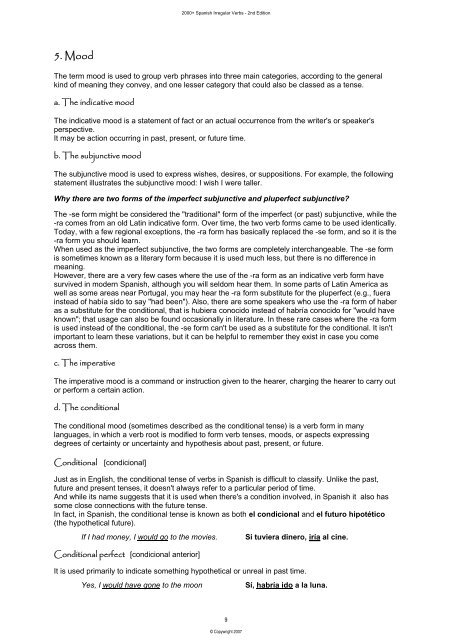2000+ Spanish Irregular Verbs - Hackvalue
2000+ Spanish Irregular Verbs - Hackvalue
2000+ Spanish Irregular Verbs - Hackvalue
You also want an ePaper? Increase the reach of your titles
YUMPU automatically turns print PDFs into web optimized ePapers that Google loves.
5. Mood<br />
The term mood is used to group verb phrases into three main categories, according to the general<br />
kind of meaning they convey, and one lesser category that could also be classed as a tense.<br />
a. The indicative mood<br />
The indicative mood is a statement of fact or an actual occurrence from the writer's or speaker's<br />
perspective.<br />
It may be action occurring in past, present, or future time.<br />
b. The subjunctive mood<br />
The subjunctive mood is used to express wishes, desires, or suppositions. For example, the following<br />
statement illustrates the subjunctive mood: I wish I were taller.<br />
Why there are two forms of the imperfect subjunctive and pluperfect subjunctive?<br />
The -se form might be considered the "traditional" form of the imperfect (or past) subjunctive, while the<br />
-ra comes from an old Latin indicative form. Over time, the two verb forms came to be used identically.<br />
Today, with a few regional exceptions, the -ra form has basically replaced the -se form, and so it is the<br />
-ra form you should learn.<br />
When used as the imperfect subjunctive, the two forms are completely interchangeable. The -se form<br />
is sometimes known as a literary form because it is used much less, but there is no difference in<br />
meaning.<br />
However, there are a very few cases where the use of the -ra form as an indicative verb form have<br />
survived in modern <strong>Spanish</strong>, although you will seldom hear them. In some parts of Latin America as<br />
well as some areas near Portugal, you may hear the -ra form substitute for the pluperfect (e.g., fuera<br />
instead of había sido to say "had been"). Also, there are some speakers who use the -ra form of haber<br />
as a substitute for the conditional, that is hubiera conocido instead of habría conocido for "would have<br />
known"; that usage can also be found occasionally in literature. In these rare cases where the -ra form<br />
is used instead of the conditional, the -se form can't be used as a substitute for the conditional. It isn't<br />
important to learn these variations, but it can be helpful to remember they exist in case you come<br />
across them.<br />
c. The imperative<br />
The imperative mood is a command or instruction given to the hearer, charging the hearer to carry out<br />
or perform a certain action.<br />
d. The conditional<br />
The conditional mood (sometimes described as the conditional tense) is a verb form in many<br />
languages, in which a verb root is modified to form verb tenses, moods, or aspects expressing<br />
degrees of certainty or uncertainty and hypothesis about past, present, or future.<br />
Conditional [condicional]<br />
Just as in English, the conditional tense of verbs in <strong>Spanish</strong> is difficult to classify. Unlike the past,<br />
future and present tenses, it doesn't always refer to a particular period of time.<br />
And while its name suggests that it is used when there's a condition involved, in <strong>Spanish</strong> it also has<br />
some close connections with the future tense.<br />
In fact, in <strong>Spanish</strong>, the conditional tense is known as both el condicional and el futuro hipotético<br />
(the hypothetical future).<br />
If I had money, I would go to the movies. Si tuviera dinero, iría al cine.<br />
Conditional perfect [condicional anterior]<br />
<strong>2000+</strong> <strong>Spanish</strong> <strong>Irregular</strong> <strong>Verbs</strong> - 2nd Edition<br />
It is used primarily to indicate something hypothetical or unreal in past time.<br />
Yes, I would have gone to the moon Sí, habría ido a la luna.<br />
9<br />
© Copywright 2007


